 Your new post is loading...
 Your new post is loading...

|
Scooped by
Gust MEES
|

|
Scooped by
Gust MEES
|
Die großen Browser-Hersteller Mozilla, Google und Microsoft unterstützen den neuen Web-Standard WebAuthentication, kurz: WebAuthn. Er könnte künftig Passwörter im Internet überflüssig machen.
Der kommende Web-Authentication-Standard – kurz: WebAuthn – macht die Eingabe von Passwörtern bald überflüssig. Nutzer können sich bei Online-Diensten einfach mit ihrem (USB-)Token, Fingerabdruck oder einem anderen biometrischen Verfahren einloggen. Die großen Browser-Hersteller Google, Mozilla und Microsoft haben nun bekannt gegeben, dass sie den Standard unterstützen und in ihre Browser implementieren wollen. Dieser wichtige Support leite eine "neue Ära der allgegenwärtigen, phishing-resistenten und starken Authentifizierung ein", freut sich die FIDO-Allianz. FIDO hatte sich im Sommer 2012 gebildet, um offene Authentifizierungsstandards fürs Internet zu entwickeln. Learn more / En savoir plus / Mehr erfahren: https://www.scoop.it/t/securite-pc-et-internet/?&tag=Browsers

|
Scooped by
Gust MEES
|
Google says that it is getting better than ever at protecting Android users against bad apps and malicious developers.
In fact, in a recent post on the Android Developers blog, the company boasts that it removed a record number of malicious apps from the official Google Play store during 2017.
How many apps did Google remove from its app marketplace after finding they violated Google Play store policies? More than 700,000. That’s an impressive 2000 or so every day, and 70% more than the number of apps removed in 2016.
Furthermore, Google says it is getting better at proactively protecting Android users from the growing menace of mobile malware:
“Not only did we remove more bad apps, we were able to identify and action against them earlier. In fact, 99% of apps with abusive contents were identified and rejected before anyone could install them. This was possible through significant improvements in our ability to detect abuse – such as impersonation, inappropriate content, or malware – through new machine learning models and techniques.”
Furthermore, Google claims it banned more than 100,000 developer accounts controlled by “bad actors” who had attempted to create new accounts and publish yet more malicious apps. Learn more / En savoir plus / Mehr erfahren: https://gustmees.wordpress.com/2014/03/05/often-asked-questions-are-there-cyber-security-dangers-with-apps-and-whats-about-privacy/ https://www.scoop.it/t/securite-pc-et-internet/?&tag=Android

|
Scooped by
Gust MEES
|

|
Scooped by
Gust MEES
|
Les deux enceintes intelligentes de Google et Amazon, le Google Home et l’Amazon Echo, victimes de la faille Bluetooth BlueBorne.
Des chercheurs ont réussi à prouver que la faille Bluetooth BlueBorne impactait aussi les enceintes intelligentes Google Home et l’Amazon Echo. Révélées il y a quelques semaines, huit failles critiques de Bluetooth ont récemment étaient révélées. Elles affectent des milliards d’appareils Android, iOS, Windows et Linux. Voilà que les deux assistants des deux géants du web sont aussi impliqués dans cet énorme « merdier » numérique comme le confirme la société Armis. Learn more / En savoir plus / Mehr erfahren: https://www.scoop.it/t/securite-pc-et-internet/?&tag=BlueBorne

|
Scooped by
Gust MEES
|
Das Bundesamt für Sicherheit in der Informationstechnik (BSI) warnt vor drei Sicherheitslücken in Googles Chrome-Browser. Auch die Open-Source-Variante Chromium soll betroffen sein.
Zwei der Schwachstellen sind als kritisch eingestuft. Sie ermöglichen es Hackern, beliebigen Code auszuführen.
Nutzern, die noch nicht auf die aktuellen Versionen (jeweils 61.0.3163.100) umgestiegen sind, wird dringend angeraten, das Browser-Update durchzuführen. Betroffen von der Schwachstelle sind Systeme mit Windows (ab Windows XP), Macintosh (Mac OS X und macOS Sierra) sowie Linux und Chrome OS. Bei Letzterem ist der Browser integraler Bestandteil.
Laut BSI ermöglichen die Lücken "einem entfernten, nicht authentifizierten Angreifer" das Ausführen von beliebigem Code. So könnte etwa ein Denial-of-Service (DoS)- Angriff durchgeführt werden.
Learn more / En savoir plus / Mehr erfahren: https://gustmees.wordpress.com/2012/05/02/get-smart-with-5-minutes-tutorialsit-securitypart-1-browsers/ https://gustmeesde.wordpress.com/2014/12/16/browser-sind-das-einfallstor-fur-malware-sind-eure-browser-up-to-date/

|
Scooped by
Gust MEES
|
Zwei Tage lang demonstrierten Hacker in Seoul auf dem "PwnFest" diverse Schwachstellen verbreiteter Software, darunter der Browser Edge und Safari. Auch VMWare Workstations und das Google Pixel wurden geknackt.
Im Rahmen des Hacker-Events "PwnFest 2016" haben Teilnehmer am vergangenen Donnerstag jeweils gleich zweimal Sicherheitsprobleme bei Microsoft Edge unter Windows 10 (Red Stone 1) und von VMWare Workstation 12.5.1 demonstriert. Am Freitag knackte ein chinesisches Hacker-Team dann auch Googles Smartphone Pixel mit Android 7/Nougat und zeigten Sicherheitslücken in Apples Browser Safari unter macOS Sierra auf. Das zweitägige Hackerfestival PwnFest fand im Rahmen der "Power of Community"-Sicherheitskonferenz in Seoul statt. Learn more / En savoir plus / Mehr erfahren: http://www.scoop.it/t/securite-pc-et-internet

|
Scooped by
Gust MEES
|
Sécurité : Google explique sur son blog qu’à partir du début 2017, son navigateur avertira les utilisateurs qui se trouvent sur une page non protégée par HTTPS et qui leur demande de s’identifier. Un nouveau moyen d’inciter les sites à migrer vers le chiffrement des connexions. Learn more / En savoir plus / Mehr erfahren: http://www.scoop.it/t/securite-pc-et-internet/?tag=HTTPS

|
Scooped by
Gust MEES
|

|
Scooped by
Gust MEES
|

|
Scooped by
Gust MEES
|
Google and enterprise software firm Red Hat have discovered a critical security flaw affecting the Internet's Domain Name System (DNS), found in a universally used protocol. This means an attacker could use it to infect almost everything on the entire internet. With the flawed code spread far and wide, it will likely take years of effort to patch the bug.
Google and Red Hat engineers both independently discovered the DNS bug within the GNU C standard library (glibc), which has been assigned CVE-2015-7547, and then worked together to create a patch. The security vulnerability works by tricking browsers into looking up suspicious domains, which causes servers to reply with DNS names that are far too long, thus causing a buffer overflow in the victim's software.
Learn more / En savoir plus / Mehr erfahren:
http://www.scoop.it/t/securite-pc-et-internet/?tag=Linux

|
Scooped by
Gust MEES
|
Android wird erneut von einer riesigen Sicherheitslücke geplagt. Und Einfallstor des Virus ist niemand geringerer als die Google-Chrome-App. Besucht man in Google Chrome eine manipulierte Webseite, können Angreifer die komplette Kontrolle über das Smartphone übernehmen und das komplette Gerät plattmachen.
Learn more / En savoir plus / Mehr erfahren:
http://www.scoop.it/t/securite-pc-et-internet/?tag=Android
|

|
Scooped by
Gust MEES
|
Microsofts Browser Protection ist jetzt als Erweiterung auch für Google Chrome verfügbar. Das Add-on fügt dem Browser eine zusätzliche Sicherheitsebene zum Schutz vor schadhaften Links und Phishing-Attacken hinzu.
Windows Defender Browser Protection: Die Schutzfunktion aus Microsoft Edge gibt es jetzt auch als Chrome-Erweiterung.
Microsoft stattet seinen Edge-Browser standardmäßig mit einer Schutzfunktion für das Surfen im Internet aus. Diese soll Nutzer vor bösartigen Links und Phishing-Attacken bewahren. Jetzt bieten die Redmonder ihre Browser Protection auch für Google Chrome als Erweiterung an.
In der Praxis scannt die Windows Defender Browser Protection automatisch angesurfte Webseiten sowie Links und gleicht diese mit einer Blacklist von Microsoft ab. Sobald ein potenziell gefährlicher Link aus der Liste angesteuert wird, spielt die Schutzlösung einen deutlichen Warnhinweis aus. Über eine Schaltfläche lässt sich die Funktion beliebig an- und ausschalten.
Google Chrome verfügt zwar mit Safe Browsing über eine ganz ähnliche Funktion, in einem Test der Sicherheitsspezialisten NSS Labs schnitt die Schutzlösung von Microsoft allerdings deutlich besser ab als das Pendant von Google. Während die zugrundeliegende Technologie aus Microsoft Edge 99 Prozent aller Phishing-Attacken stoppte, erkannte Chrome nur 87 Prozent.
Daneben besitzt auch Firefox eine Protection-Lösung für sicheres Surfen, diese landete mit einer Erkennungsrate von 70 Prozent im Test von NSS Labs auf dem dritten Platz. Für den Open-Source-Browser bietet Microsoft allerdings keine Windows-Defender-Erweiterung an. Learn more / En savoir plus / Mehr erfahren: https://gustmees.wordpress.com/2012/05/02/get-smart-with-5-minutes-tutorialsit-securitypart-1-browsers/ https://gustmeesde.wordpress.com/2014/12/16/browser-sind-das-einfallstor-fur-malware-sind-eure-browser-up-to-date/

|
Scooped by
Gust MEES
|
Ein kleiner Schritt in Richtung Phishing-freie Welt? Schon länger ist bekannt, dass ein Login per Nutzername und Passwort nicht die sicherste Methode ist – Alternativen müssen her. Mozilla, Google und Microsoft unterstützen jetzt einen Login-Standard ohne Passwort-Eingabe.
Eine 2-Faktor-Authentifizierung mit einem zusätzlichen Code per SMS oder Mail gibt es bereits seit einigen Jahren, doch nur wenige Nutzer sichern über diese - eher unbequeme - Weise ihre Accounts ab. Login auch ohne Passwort? Das soll mit einem weiteren Standard, FIDO, möglich sein. Dabei funktioniert der Login etwa durch biometrische Verfahren - wie zum Beispiel dem Iris-Scanner oder Fingerabdruck, die das Smartphone entsperren - oder durch einen Token in Form von einem USB-Stick, der einfach am Schlüsselbund getragen werden kann. Wie das World Wide Web Consortium (W3C) und die FIDO-Allianz verkündeten, unterstützen künftig Firefox, Chrome und Edge die Schnittstelle zu FIDO für Webseiten: WebAuthn. Firefox unterstützt bereits mit der aktuellen Version, wohingegen Chrome und Edge erst mit kommenden Versionen in den nächsten Monaten nachrücken werden. Learn more / En savoir plus / Mehr erfahren: https://www.scoop.it/t/securite-pc-et-internet/?&tag=Browsers

|
Scooped by
Gust MEES
|

|
Scooped by
Gust MEES
|
Google has confirmed it has been able to track the location of Android users via the addresses of local mobile phone masts, even when location services were turned off and the sim cards removed to protect privacy.
Revealed by a report by Quartz, Google’s Android system, which handles messaging services to ensure delivery of push notifications, began requesting the unique addresses of mobile phone masts (called Cell ID) at the beginning of 2017.
The information was captured by the phone and routinely sent to Google by any modern Android device, even when location services were turned off and the sim card was removed. As a result Google could in theory track the location of the Android device and therefore the user, despite a reasonable expectation of privacy.
A Google spokesperson said: “In January of this year, we began looking into using Cell ID codes as an additional signal to further improve the speed and performance of message delivery.
“However, we never incorporated Cell ID into our network sync system, so that data was immediately discarded, and we updated it to no longer request Cell ID.” Learn more / En savoir plus / Mehr erfahren: https://www.scoop.it/t/securite-pc-et-internet/?&tag=Cyberespionage https://www.scoop.it/t/securite-pc-et-internet/?&tag=Privacy https://gustmees.wordpress.com/2013/12/21/privacy-in-the-digital-world-shouldnt-we-talk-about-it/ https://www.scoop.it/t/securite-pc-et-internet/?&tag=tracking

|
Scooped by
Gust MEES
|
Google announced yesterday three new security features for Chrome that will help the company's browser detect and fight intrusive extensions and invasive software.
The features are part of a long-standing effort that also includes tools like the company's SafeBrowsing API.
Simpler warnings when extensions hijack settings
The first is Chrome's new ability to detect whenever an extension makes changes to the user's default settings. These include settings for the user's search engine, homepage, or proxy settings. Learn more / En savoir plus / Mehr erfahren: https://gustmees.wordpress.com/2012/05/02/get-smart-with-5-minutes-tutorialsit-securitypart-1-browsers/

|
Scooped by
Gust MEES
|
A million Google accounts have been compromised in a massive fraud campaign exploiting Android devices and Google Play.
At the heart of the campaign is a new variant of Android malware dubbed Gooligan, concealed in dozens of Android apps that exploit two unpatched flaws in Android to root infected devices.
The malware nabs email account information and authentication tokens for accessing Google accounts. The attackers use the tokens to install select apps from Google Play on an infected device to boost in-app advertising revenue. Learn more / En savoir plus / Mehr erfahren: http://www.scoop.it/t/securite-pc-et-internet/?tag=Android

|
Scooped by
Gust MEES
|

|
Scooped by
Gust MEES
|

|
Scooped by
Gust MEES
|

|
Scooped by
Gust MEES
|

|
Scooped by
Gust MEES
|
There's likely no Internet user that hasn't, at some point, been tricked into clicking on a deceptive

|
Scooped by
Gust MEES
|
Google Chrome users will from now on be faced with a new, customized warning every time they visit a website/page that contains social engineering content...
|



 Your new post is loading...
Your new post is loading...

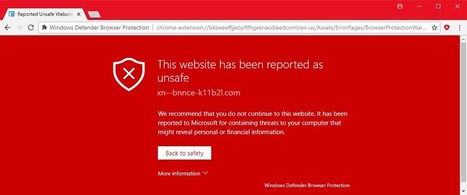

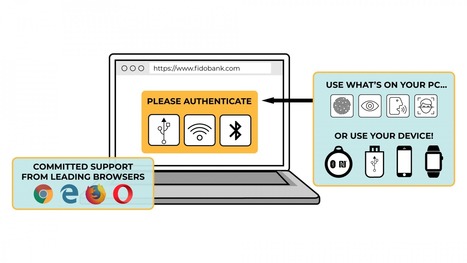














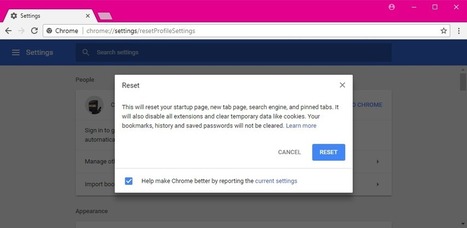
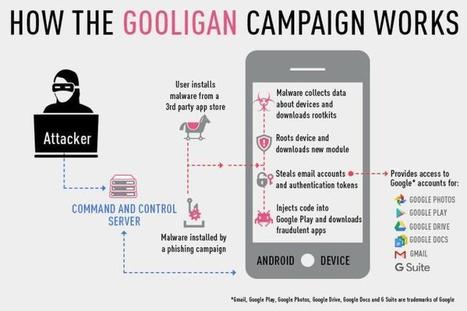


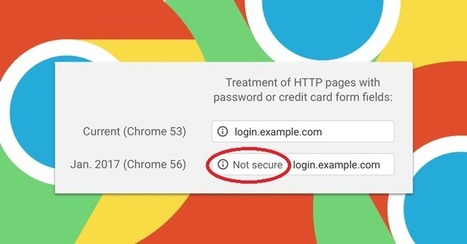

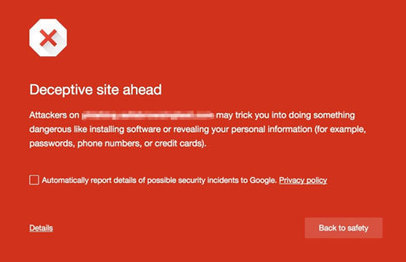






Microsoft has released a Chrome extension named "Windows Defender Browser Protection" that ports Windows Defender's —and inherently Edge's— anti-phishing technology to Google Chrome.
The extension works by showing bright red-colored pages whenever users are tricked into accessing malicious links.
https://gustmees.wordpress.com/2012/05/02/get-smart-with-5-minutes-tutorialsit-securitypart-1-browsers/
https://gustmeesde.wordpress.com/2014/12/16/browser-sind-das-einfallstor-fur-malware-sind-eure-browser-up-to-date/